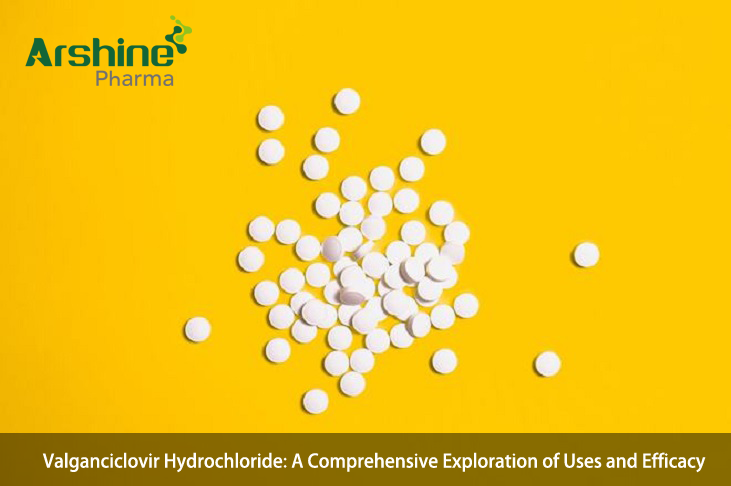
Introduction
Valganciclovir hydrochloride is a potent antiviral medication that has proven its efficacy in the treatment and prevention of cytomegalovirus (CMV) infections. Derived from ganciclovir, Valganciclovir is a prodrug that gets rapidly converted into its active form within the body, making it a preferred option due to its enhanced bioavailability and convenient oral administration. This comprehensive exploration will delve into the various applications, mechanisms of action, therapeutic uses, and potential side effects of Valganciclovir hydrochloride.
Mechanism of Action
Valganciclovir hydrochloride exerts its antiviral effects by inhibiting viral DNA replication. Once inside the body, it undergoes a two-step phosphorylation process, first by cellular kinases and then by the viral kinase encoded by CMV. This conversion results in the formation of triphosphate, which is incorporated into the growing viral DNA chain. This incorporation terminates the elongation of the DNA chain and prevents further viral replication, thereby curbing the spread of the virus.
Therapeutic Indications
Valganciclovir hydrochloride primarily finds its applications in the management of CMV infections, especially in immunocompromised patients, such as those undergoing organ transplantation or those with HIV. CMV infections can lead to serious complications like retinitis, pneumonitis, and gastrointestinal diseases in these populations. Valganciclovir's ability to halt CMV replication makes it an essential tool in preventing and treating these infections. Additionally, its oral formulation provides a convenient option for outpatient management.
Efficacy in Organ Transplantation
Organ transplant recipients are particularly susceptible to CMV infections due to the immunosuppressive regimens required to prevent organ rejection. Valganciclovir hydrochloride plays a pivotal role in prophylaxis and preemptive therapy in these patients. Prophylactic use of Valganciclovir involves administering the medication for a specified duration after transplantation to prevent the development of CMV infection. On the other hand, preemptive therapy involves monitoring CMV viral load and initiating Valganciclovir treatment upon detection, before the onset of symptoms. Both approaches have been effective in reducing CMV-related morbidity and mortality in transplant recipients.
Role in HIV Patients
HIV-infected individuals with low CD4 counts are also at an increased risk of CMV reactivation and disease progression. Valganciclovir hydrochloride has shown promise in decreasing CMV viral load in these patients, thus aiding in the management of both HIV and CMV infections concurrently. By reducing the burden of CMV, Valganciclovir indirectly contributes to improved immune function and reduced opportunistic infections in HIV patients.
Ocular CMV Disease
CMV retinitis is a sight-threatening condition that can occur in immunocompromised individuals. Valganciclovir hydrochloride has been effective in treating CMV retinitis, preventing its progression, and preserving visual function. Its oral formulation is particularly advantageous in this context, as it eliminates the need for intravenous administration, improving patient compliance and quality of life.
Safety Profile and Side Effects
While Valganciclovir hydrochloride offers substantial benefits, it is essential to acknowledge potential side effects. Common adverse reactions include gastrointestinal disturbances, hematological abnormalities (neutropenia and anemia), and elevated liver enzymes. Patients on Valganciclovir require regular monitoring of blood counts and renal function to mitigate these risks. Moreover, Valganciclovir is contraindicated in patients with impaired renal function, as dose adjustments are necessary to prevent drug accumulation and toxicity.
Conclusion
Valganciclovir hydrochloride stands as a potent tool in the battle against CMV infections, particularly in immunocompromised populations. Its mechanism of action, coupled with its convenient oral administration, makes it a valuable asset in preventing and managing CMV-associated complications. From organ transplant recipients to HIV-infected individuals, Valganciclovir's efficacy spans a wide spectrum of patient groups. However, vigilance regarding its potential side effects is crucial, requiring close monitoring and proper patient selection.
In an era of advancing medical knowledge, Valganciclovir hydrochloride's significance is poised to remain high, fostering ongoing research and innovation in the field of antiviral therapy. As we continue to unravel the complexities of viral infections and immunosuppression, Valganciclovir's role will likely evolve, potentially expanding its applications and enhancing its overall impact on patient care.
